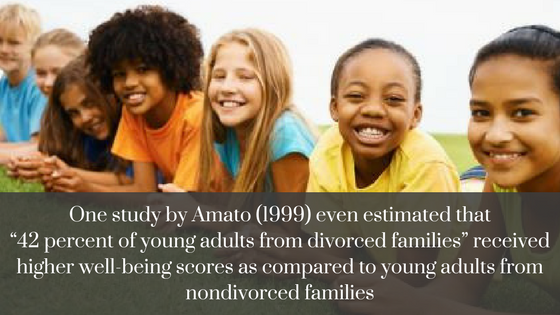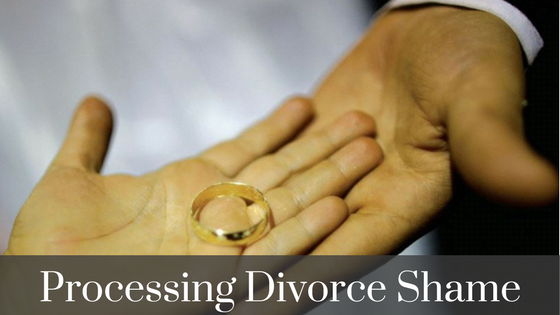By: Dr. Kristen Godenick
Many times, parents contact me and are wondering about how to help their children through the divorce process, from the process of telling them through the process of rebuilding their schedules and lives within two households. From my perspective, the process has to begin with the parents’ own actions taken to help themselves.
What does this mean, and how can we walk through the process of “parental self-help?”
Processing Divorce Shame & Guilt
In terms of negative emotions surrounding a divorce or separation, there are plenty to choose from. Even with divorces that are declared “amicable”, there may be hidden negative feelings that parents have toward themselves. One very common negative emotional phenomenon I see is shame.
Shame can produce primary feelings of sadness, fear, and anger. These feelings can lead to negative behaviors, like fighting or unhealthy coping habits. When we think about some of the thoughts that promote and feed shame, there can be many. Shame thoughts feed shame emotions, and in turn shame emotions feed unhealthy parental behaviors. I will always tell parents, take care of yourself first in order to break the shame cycle! Your children cannot have a healthy outcome if you do not have a healthy outcome.
Unhealthy Thinking Patterns About Divorce
Recognizing unhealthy thoughts can help you to not fall into shame that many feel in the divorce process. In terms of Cognitive Behavioral Therapy, “unhelpful thinking habits that promote shame” can be classified into different types.
These habits are also known as “thinking traps.” Here are six common ones I see regularly in practice:
- Mental Filter: We notice only what “fits” our self-assessment of shameful.
- Example: “Shame on me! I am a shame-worthy mother. I cannot see my empathic nature or great listening skills. I only see when I yelled at my children.”
- Mind-Reading: We assume others think we are shameful.
- Example: “Shame on me! My child’s teacher disagreed with me at the meeting today about a homework intervention and offered a solution from a teaching perspective. She knows I am a shame worthy father going through a divorce and cannot help my own child.”
- Prediction: We know that the future will involve more opportunities to be shamed, therefore we do not take any actions to move forward with our lives.
- Example: “Shame on me! If I ask for help from my child’s guidance counselor, she will know I am a shame worthy mother. I won’t ask.”
- Compare to others: We see only the good in others and only the bad in ourselves.
- Example: “Shame on me! Those celebrity dads really know how to do healthy divorce, look how perfect their lives are. I will never even be close!”
- Shoulds: We create a list of “I should____” “I should____” I should___” that creates pressure and unrealistic expectations.
- Example: “Shame on me! I should be happy right now. I should be loving toward my co-parent/ex-spouse. I should be maximizing my child’s achievement with all the best extracurricular activities. I should be able to chauffeur them to seven activities this week. If not, I am definitely a shame worthy mother.”
- Catastrophising: We imagine that the worst possible outcome is guaranteed to happen.
- Example: “If I tell my children we are getting divorced, they will be forever messed up and unable to adjust. Shame on me, what a bad father I turned out to be.”
Shifting Your Perspective
There are many thoughts & emotions that go through your mind when going through a divorce. The fact of the matter is everything changes. Rest assured, many of these worries and fears you have can be processed to help you cope during this challenging time. For example, one fear may like the one mentioned above “If I tell my children we are getting divorced, they will be forever messed up and unable to adjust.” New studies have found that divorce may help boost resilience in some children & situations.
For example, there was a study performed to determine resilience in children after a divorce and the results showed:

“Despite the significant stressors associated with divorce, approximately 75-80 percent of children develop into well-adjusted adults with no lasting psychological or behavioral problems (7). They achieve their education and career goals and have the ability to build close relationships. One study by Amato (1999) even estimated that “42 percent of young adults from divorced families” received higher well-being scores as compared to young adults from nondivorced families (7). Therefore, the hardship and pain associated with their parents’ divorce made them stronger individuals. Children from high conflict families oftentimes benefit the most from the divorce of their parents as it represents an opportunity for a better life.“
Many of our thoughts and patterns are a matter of perspective and in the middle of hard situations, it may seem impossible to process on your own. If you are a parent struggling with these types of feelings, you are not alone and do not need to suffer alone. If you’re dealing with shame or other emotions that are associated with divorce, one of the best ways to process them is through talk therapy. Getting a professional outside perspective about what you’re feeling can help you understand and process what you’re dealing with and ultimately benefit you and your children.
Dr. Godenick is a clinical psychologist in private practice in the Cincinnati Ohio metropolitan area, specializing in anxiety disorders. She holds a certification in Family Trauma studies from the International Association of Trauma Professionals.

